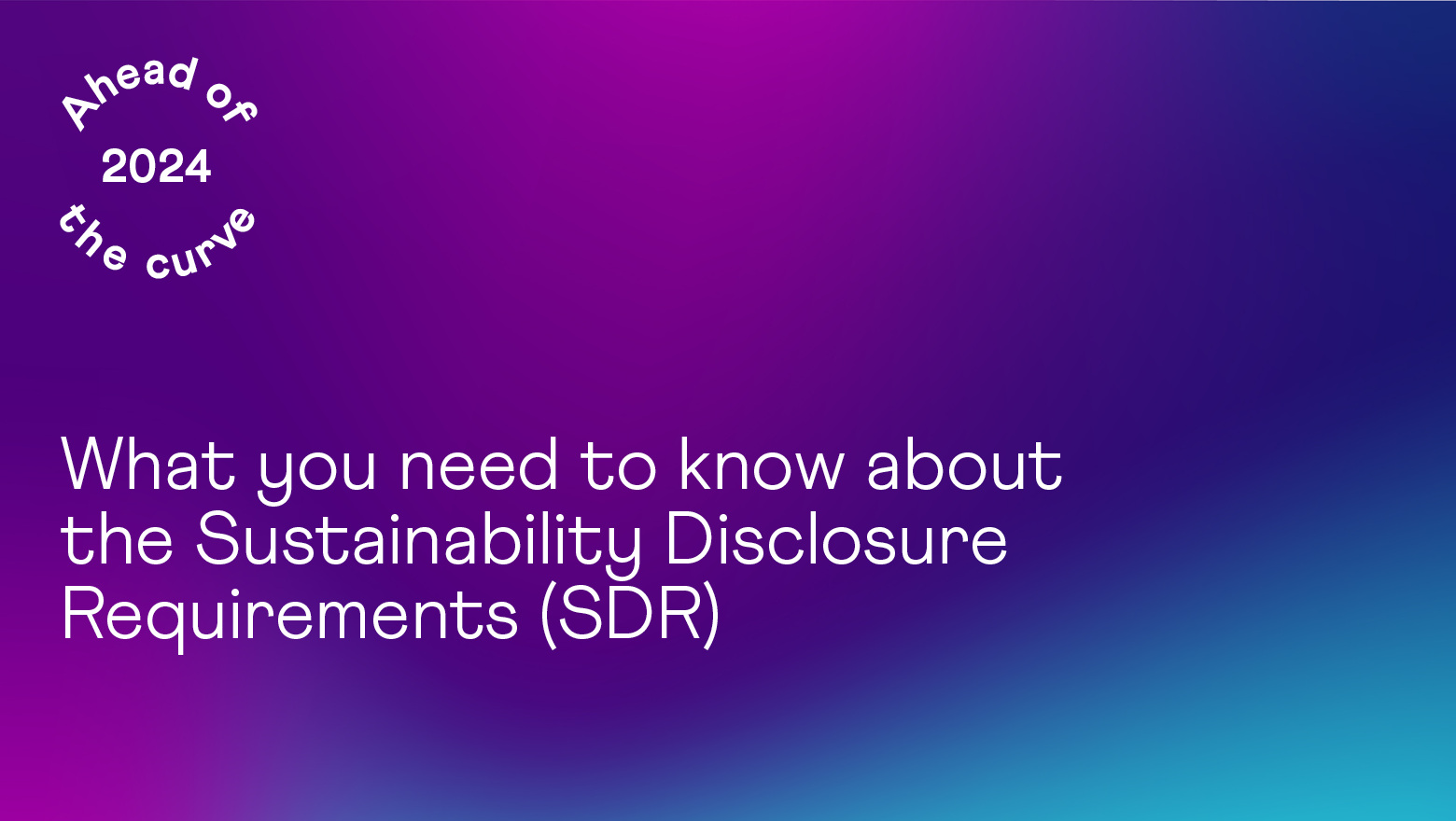
"Alongside the other elements of the “Economy Wide Regime”, the SDR should drive the move towards a sustainable, low-carbon economy, supporting consumer identification of the organisations that have developed transparent and authentic sustainability strategies."
Stay informed with regulations, insights & events by joining our mailer
Since the November 2021 launch of its environmental, social and governance (ESG) priorities, the Financial Conduct Authority (FCA) has been striving to tackle greenwashing and increase transparency and trust in the financial market between consumers and firms.
Integrity of the market is an important goal for the FCA. Transparency plays a significant role in ensuring firms are claiming their sustainability credentials in a way that consumers can trust and that is representative of their impact.
The UK Government’s Green Finance Strategy (March 2023) aims to mobilise green investment. The FCA’s Sustainability Disclosure Requirements (SDR) form part of this “Economy Wide Regime” alongside:
- International Financial Reporting Standards (IFRS) that are to be adapted into UK law (as UK Sustainability Disclosure Standards (SDS));
- transition plan disclosure;
- developing a green taxonomy; and
- nature related disclosures.
Why has the SDR been introduced?
The SDR has been developed in response to growing concern about exaggerated, misleading or unsubstantiated claims. Loss of trust and integrity in the market is detrimental to the required mobilisation of funds towards a green transition. For context, the Climate Change Committee states that an additional £50 billion in low carbon investment each year is required to deliver Net Zero in the UK.
What to expect
The final package of measures, which applies to all FCA-authorised firms, includes:
- an anti-greenwashing rule – “sustainability-related claims must be fair, clear and not misleading”;
- four labels to support consumer navigation of the investment product landscape and enhance consumer trust;
- naming and marketing rules for investment products, ensuring that the use of language and sustainability-related terms is correct;
- consumer-facing information – provision of better, more accessible information to support consumer understanding of the key sustainability features of a product;
- detailed information - in pre-contractual, ongoing product level, and entity level disclosures which are targeted at institutional investors and consumers; and
- requirements for distributors – ensuring that all product-level information is made available to consumers.
What are the four labels?
The four labels cover either or both environmental and social sustainability and are differentiated using the following criteria:
1. Sustainability Focus
Investment Products (IP) where >70% is invested in sustainable assets – e.g. a fund focused on supporting the production of renewable energy.
2. Sustainability Improvers
IP where >70% is invested in assets that have the potential to improve sustainability over time – e.g. funds focused on companies in emerging markets, with fixed targets and commitments towards sustainability improvements in line with recognised global standards.
3. Sustainability Impact
IP where >70% is invested in assets with the aim to achieve a pre-defined positive, measurable impact concerning a sustainability outcome. The key differentiator for this label is that firms must measure and report how their investment activities contribute to achieving the set of expected positive outcomes alongside how the assets are achieving the impact.
4. Sustainability Mixed Goals
IP where >70% is invested following a combination of the objectives within the other three labels – e.g. reporting on the relative proportion of an IP that is invested in assets that are already deemed sustainable and those that have the potential to improve over time, meeting both of the criteria for the Sustainability Focus and Sustainability Improvers labels respectively.
The SDR and investment labels regime can bring a welcome degree of transparency and assurance to the sustainability marketplace. Alongside the other elements of the “Economy Wide Regime”, the SDR should drive the move towards a sustainable, low-carbon economy, supporting consumer identification of the organisations that have developed transparent and authentic sustainability strategies.
What next?
The Anti-greenwashing rule is set to come into play by 31st May 2024, with the other requirements staggered over the next year. Compliance will be key moving forward.
Firms will need to understand their position concerning the SDR to remain competitive with the wider market, ensuring their sustainability agendas are compliant with market policies. Ever Sustainable is uniquely positioned to support clients in bolstering their sustainability credentials while also providing support on how to communicate these credentials transparently and authentically.
